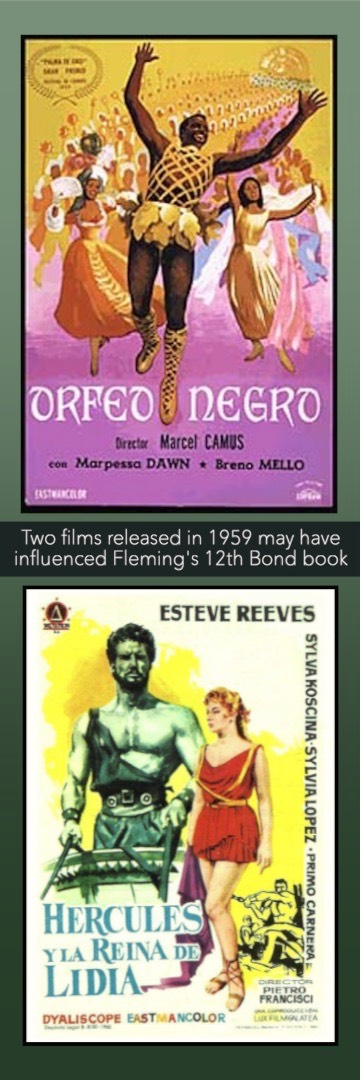An English-Brazilian-Italian Co-Production
I’ve written that You Only Live Twice suddenly shifts gears from the Middle-English poem Sir Orfeo to the final labor of Hercules during Bond’s visit to Blofeld’s castle. On reflection, however, it occurs to me that the Herculean theme is present almost from the beginning. The ending definitely mirror's the Greek hero’s 12th labor, but the first half of the book has striking parallels to number 11, the quest for the Golden Apples of the Hesperides.

The Myth:
To pick up the trail of clues left by Fleming, we need to remember that the 12 Labors of Hercules were performed as penance, to atone for the death of his family. Unable to find the apples on his own, Hercules was forced to support the combined weight of the earth and the sky on his shoulders, while Atlas strode off to visit his daughters, the Hesperides. These were nymphs who lived in a garden on the westernmost island where the sun plunged into the sea at night, and where the luster of the legendary apples supposedly painted the golden glow of the evening sky. Of course, the apples were merely on loan to Hercules and had to be returned.
The Book:
Nagged by guilt over the death of his wife, Bond heads for the Land of the Rising Sun to borrow an advanced code-breaker called "Magic 44" with the help of Tiger Tanaka, M’s opposite number in the Japanese Secret Service. We are continually reminded that events in Japan will have consequences on a global scale. A potentially apocalyptic game of nuclear chicken must be thwarted through some delicate statecraft set in motion by Bond, who does briefly bear the fate of the world on his shoulders.
Gold also seems to be the dominant hue in You Only Live Twice. Invoked some two-dozen times, gold is the color of a day, the tails of pheasants, and the sky. A girl’s skin is compared to a golden peach. The dragon on a kimono is embroidered with gold, and Tiger Tanaka flashes a golden smile.
As for the other half of the mashup, Sir Orfeo - a much happier Middle-English version of the Greek myth of Orpheus - may have been on Fleming’s radar since the release of Marcel Camus’ film Black Orpheus in 1959. It arrived in cinemas with much ballyhoo the same year that Hercules Unchained cashed in on the sudden appetite for musclebound Greek heroes stirred up by its predecessor a year earlier.
Not merely a retelling of Sir Orfeo sprinkled with imagery from a few Greek myths, Your Only Live Twice is a genuine mashup. We might call it Orfeo Meets Hercules, With a Delicate Aftertaste of Pearl.
As mentioned elsewhere on this site, Pearl, another major contribution from the poet who wrote Sir Gawain and the Green Knight, is believed to be an elegy for a late lamented young daughter. Its mood fits perfectly with the themes of loss, grief, and atonement in You Only Live Twice, a book which ends with Bond fathering a child who may be forever lost to him.
(For a fuller explanation of Pearl’s significance in the story, see You Only Live Twice)